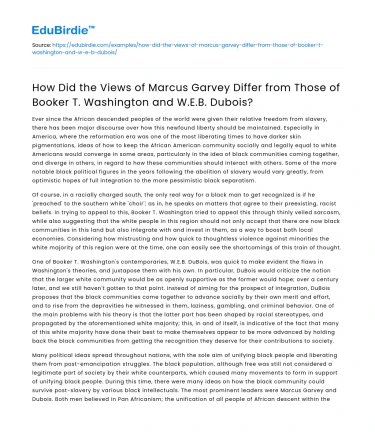Ever since the African descended peoples of the world were given their relative freedom from slavery, there has been major discourse over how this newfound liberty should be maintained. Especially in America, where the reformation era was one of the most liberating times to have darker skin pigmentations, ideas of how to keep the African American community socially and legally equal to white Americans would converge in some areas, particularly in the idea of black communities coming together, and diverge in others, in regard to how these communities should interact with others. Some of the more notable black political figures in the years following the abolition of slavery would vary greatly, from optimistic hopes of full integration to the more pessimistic black separatism.
Of course, in a racially charged south, the only real way for a black man to get recognized is if he 'preached' to the southern white 'choir'; as in, he speaks on matters that agree to their preexisting, racist beliefs. In trying to appeal to this, Booker T. Washington tried to appeal this through thinly veiled sarcasm, while also suggesting that the white people in this region should not only accept that there are now black communities in this land but also integrate with and invest in them, as a way to boost both local economies. Considering how mistrusting and how quick to thoughtless violence against minorities the white majority of this region were at the time, one can easily see the shortcomings of this train of thought.
Save your time!
We can take care of your essay
- Proper editing and formatting
- Free revision, title page, and bibliography
- Flexible prices and money-back guarantee
One of Booker T. Washington's contemporaries, W.E.B. DuBois, was quick to make evident the flaws in Washington's theories, and juxtapose them with his own. In particular, DuBois would criticize the notion that the larger white community would be as openly supportive as the former would hope; over a century later, and we still haven't gotten to that point. Instead of aiming for the prospect of integration, DuBois proposes that the black communities come together to advance socially by their own merit and effort, and to rise from the depravities he witnessed in them, laziness, gambling, and criminal behavior. One of the main problems with his theory is that the latter part has been shaped by racial stereotypes, and propagated by the aforementioned white majority; this, in and of itself, is indicative of the fact that many of this white majority have done their best to make themselves appear to be more advanced by holding back the black communities from getting the recognition they deserve for their contributions to society.
Many political ideas spread throughout nations, with the sole aim of unifying black people and liberating them from post-emancipation struggles. The black population, although free was still not considered a legitimate part of society by their white counterparts, which caused many movements to form in support of unifying black people. During this time, there were many ideas on how the black community could survive post-slavery by various black intellectuals. The most prominent leaders were Marcus Garvey and Dubois. Both men believed in Pan Africanism; the unification of all people of African descent within the diaspora. However, both men had different views on how to overcome post-slavery struggles while still maintaining the connection to their roots, Africa. DuBois strongly believed in integration; a society where black Americans and white Americans could coexist and have equal rights only if black Americans proved themselves to be more than what the white men thought of them; slaves. He believed that if there were ten intellectuals, “talented ten” who can be successful and be leaders in the all-white world, they can pave way for the rest of the black people in the United States. Garvey, on the other hand, believed in helping the mass instead of focusing on just the intellects. He believed that people of African descent can unite and only flourish if they stopped trying to please the white man and focused their intellect on trying to improve Africa by physically moving into the continent. In his work, Philosophy, and Opinions, he explains how every race had its place in the world. By the Divine Creator, the white man was given Europe, the “yellow” man, Asia and black people belonged to Africa, (Garvey 32). Garvey supported the reconstruction of black societies and the promotion of black trade with his business, the Black Star Line. Although he had some complications with some of his ideas, he worked to unify the black community internationally and also to improve upon their struggles.
From gaining freedom to being racially segregated, African Americans have been systematically oppressed for such a long time. From the end of the nineteenth century through the first third of the twentieth century, African Americans rose over their oppression and coped with their difficulties by reconnecting to Africa which promoted unity amongst all black people across the continent. Either through religion, politics, or art, African Americans were able to reclaim their identity and know their rights as equal members of society.






 Stuck on your essay?
Stuck on your essay?

